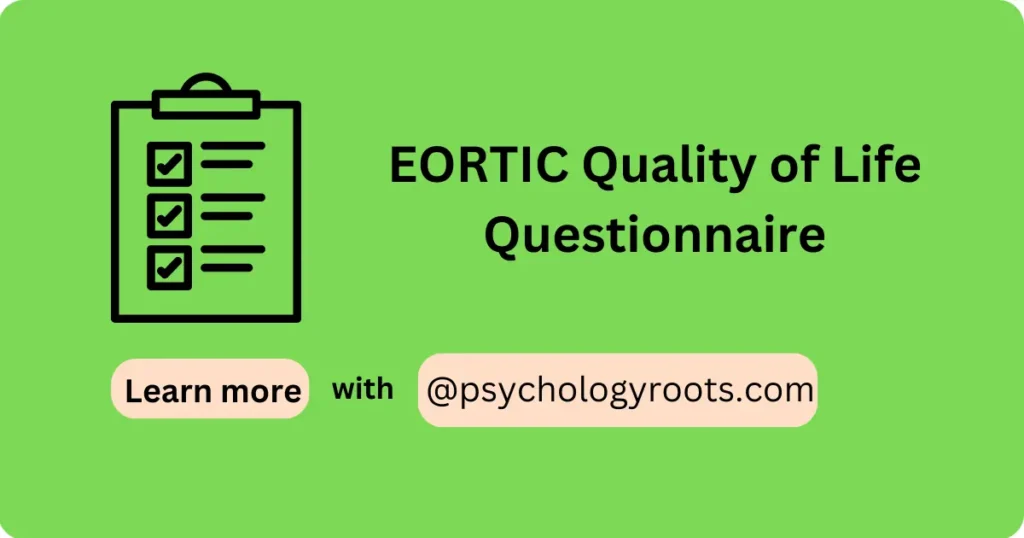Table of Contents
EORTIC Quality of Life Questionnaire
Here in this post, we are sharing the “EORTIC Quality of Life Questionnaire”. You can read psychometric and Author information. We have thousands of Scales and questionnaires in our collection (See Scales and Questionnaires). You can demand us any scale and questionnaires related to psychology through our community, and we will provide you with a short time. Keep visiting Psychology Roots.
About Scale Name
Scale Name
EORTIC Quality of Life Questionnaire
Author Details
Paul de Graeff, Dr. Paul A.J. van Dam, Dr. John J.M. de Haes, Dr. Jan M.J. Visser, Dr. Theo J.A.M. Coebergh, Dr. E.J.P. van der Velden
Translation Availability
Not Sure

Background/Description
The EORTC Quality of Life Questionnaire (EORTC QLQ-C30) is a 30-item questionnaire that is used to measure the quality of life of cancer patients. It was developed by the European Organization for Research and Treatment of Cancer (EORTC) in the early 1980s.
The background of the EORTC QLQ-C30 can be traced back to the 1970s, when there was a growing awareness of the importance of quality of life in cancer care. At the time, most clinical trials focused on the efficacy of cancer treatments, but there was little attention paid to the impact of these treatments on the quality of life of patients.
The EORTC QLQ-C30 was developed in response to this need for a tool to measure the quality of life of cancer patients. The goal of the questionnaire was to provide a comprehensive assessment of the physical, psychological, and social dimensions of quality of life.
The EORTC QLQ-C30 was first published in 1986 and has since been translated into over 100 languages. It is one of the most widely used quality of life questionnaires in the world and is used in clinical trials, research studies, and clinical practice.
The EORTC QLQ-C30 is a self-report questionnaire that can be completed by patients in about 15 minutes. It is scored on a 0-100 scale, with 100 representing the best possible quality of life and 0 representing the worst possible quality of life.
The EORTC QLQ-C30 is composed of 5 multi-item scales:
- Physical functioning
- Role functioning
- Social functioning
- Emotional functioning
- Cognitive functioning
In addition to the 5 multi-item scales, there are also 9 single items that assess specific aspects of quality of life, such as pain, fatigue, appetite loss, nausea/vomiting, diarrhea, constipation, sleep disturbance, and financial impact.
The EORTC QLQ-C30 is a valuable tool for tracking the quality of life of cancer patients and assessing the impact of cancer treatment on their lives. It has helped to improve our understanding of the challenges that cancer patients face and has led to the development of new interventions to improve their quality of life.
Administration, Scoring and Interpretation
- Review the instructions for administering the questionnaire.
- Provide the patient with a copy of the questionnaire.
- Explain the purpose of the questionnaire and how to complete it.
- Answer any questions that the patient may have about the questionnaire.
- Collect the completed questionnaire.
- Score the questionnaire.
- Interpret the results of the questionnaire.
Reliability and Validity
Reliability refers to the consistency of the questionnaire. If the questionnaire is reliable, then the results should be consistent over time and across different patients. The EORTC QLQ-C30 has been shown to be reliable in a number of studies. For example, one study found that the test-retest reliability of the EORTC QLQ-C30 was 0.85. This means that the scores on the questionnaire were consistent over a two-week period.
Validity refers to the accuracy of the questionnaire. If the questionnaire is valid, then it should measure what it is supposed to measure. The EORTC QLQ-C30 has been shown to be valid in a number of studies. For example, one study found that the EORTC QLQ-C30 was correlated with other measures of quality of life, such as the Karnofsky Performance Status Scale. This suggests that the EORTC QLQ-C30 is measuring the same thing as these other measures.
Available Versions
30-Items
Reference
Aaronson, N. K., Ahmedzai, S., Bergman, B., et al. (1993). The European Organization for Research and Treatment of Cancer Core Quality of Life Questionnaire (QLQ-C30): a preliminary report on its development and validation. Journal of Clinical Oncology. 11, 460–471.
Official Website: Click here
Important Link
Scale File:
Frequently Asked Questions
What is the EORTC QLQ-C30?
It is a 30-item questionnaire that measures the quality of life of cancer patients.
How long does it take to complete the EORTC QLQ-C30?
It takes about 15 minutes to complete the EORTC QLQ-C30.
What is the score range for the EORTC QLQ-C30?
The score range for the EORTC QLQ-C30 is 0-100, with 100 representing the best possible quality of life and 0 representing the worst possible quality of life.
Where can I find the EORTC QLQ-C30?
The EORTC QLQ-C30 is available on the EORTC website (https://qol.eortc.org/).
Who can use the EORTC QLQ-C30?
The EORTC QLQ-C30 can be used by cancer patients, healthcare professionals, and researchers.
Disclaimer
Please note that Psychology Roots does not have the right to grant permission for the use of any psychological scales or assessments listed on its website. To use any scale or assessment, you must obtain permission directly from the author or translator of the tool. Psychology Roots provides information about various tools and their administration procedures, but it is your responsibility to obtain proper permissions before using any scale or assessment. If you need further information about an author’s contact details, please submit a query to the Psychology Roots team.
Help Us Improve This Article
Have you discovered an inaccuracy? We put out great effort to give accurate and scientifically trustworthy information to our readers. Please notify us if you discover any typographical or grammatical errors.
Make a comment. We acknowledge and appreciate your efforts.
If you have any scale or any material related to psychology kindly share it with us at psychologyroots@gmail.com. We help others on behalf of you.